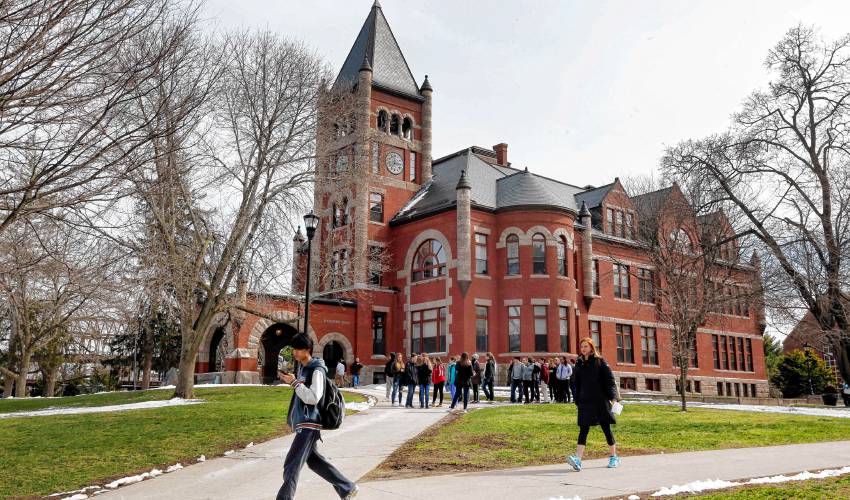UNH Faculty Senate calls on university to investigate police response to protest

In this photo taken Wednesday April 6, 2016 students walk past the historic Thompson Hall at the University of New Hampshire in Durham, N.H. Jim Cole/AP file photo
|
Published: 05-14-2024 11:43 AM
Modified: 05-14-2024 9:14 PM |
The University of New Hampshire’s Faculty Senate passed a resolution Monday calling on the university to conduct an investigation of its police response to a May 1 pro-Palestine protest.
The resolution came 12 days after UNH police arrested a dozen people outside Thompson Hall during a protest that demonstrators say was non-violent until police intervened.
“[W]e request a transparent investigation of the events surrounding the ‘May Day Rally for Palestine’, and that such investigation includes the Campus Planning Committee of the Faculty Senate,” the resolution reads.
It passed the Senate by a vote of 38 to eight, with four abstentions.
The resolution also asks administrators to host a “community forum” to discuss “the overall policies and procedures for student-organized assembly[.]”
The university has said the arrests came only after demonstrators began to set up tents in violation of school policy, according to a timeline released by university spokesperson Tania deLuzuriaga.
The timeline, released late last week, also sheds light on the involvement of Gov. Chris Sununu, who called the pro-Palestine protests sweeping the country’s college campuses “pure antisemitism” hours before the police response at UNH.
According to the timeline, Gov. Sununu called UNH President Jim Dean at 1:15 p.m. on May 1. During that conversation, Dean did not request a state police response, but later that afternoon, state police notified the university’s police department that they would be on hand during the protest anyway, per an order from Gov. Sununu. UNH’s chief of police, Paul Dean, notified the state police that they were needed at approximately 6:30 p.m., according to the timeline.
Article continues after...
Yesterday's Most Read Articles
 With Steeplegate still held up in court, city privately debates public investment
With Steeplegate still held up in court, city privately debates public investment
 Sudden pile of trash near Exit 13 on Manchester Street in Concord considered ‘illegal dumping’
Sudden pile of trash near Exit 13 on Manchester Street in Concord considered ‘illegal dumping’
 ‘Peace of mind’: As New Hampshire nixes car inspections, some Concord residents still plan to get them
‘Peace of mind’: As New Hampshire nixes car inspections, some Concord residents still plan to get them
 Mullet madness: Young man who died in motorcycle accident remembered at local fundraiser
Mullet madness: Young man who died in motorcycle accident remembered at local fundraiser
 State budget mandates sale of mental health housing in Concord
State budget mandates sale of mental health housing in Concord
 OSHA investigates Pittsfield partial building collapse
OSHA investigates Pittsfield partial building collapse
Ultimately, 13 UNH and 18 state police officers responded to the May 1 protest, according to the timeline, which was created during an “after-action review” conducted by the university’s police department and the offices of the provost, student life, and communications, deLuzuriaga said.
The actions of Dean, the police chief, have drawn particular scrutiny, including calls for his resignation. At approximately 6:30 p.m., Dean – dressed in plain clothes – charged at a group of protesters and ripped a piece of a tent from one, according to some bystanders, including professor Siobhan Senior and professor emeritus Joshua Meyrowitz. A video captures a portion of Dean’s interaction with protesters.
The after-action review concluded Dean had attempted to “de-escalate the situation.” Citing active criminal investigations of those arrested, deLuzuriaga said Dean could not respond to criticism of his response. He previously told the Boston Globe that he did not assault any students.
“I think an investigation, the information there will prove this to be wrong,” Dean said.
But, deLuzuriaga said, an investigation has yet to be launched. The after-action review that led to the creation of a timeline is a standard process following a campus event, she said.
“Any time that something goes on on campus, whether it is commencement, or something like events of May 1, the leadership meets to discuss, ‘How did things go?’,” deLuzuriaga said.
DeLuzuriaga said in a statement that university administrators will work with the Faculty Senate over the summer in response to their request for involvement in an investigation.
This article has been updated with additional details about the university’s timeline for May 1, the vote count of the Faculty Senate’s resolution, and a link to the resolution itself.







 ‘Entire paradigm has to shift’: Majority of parents express support for phone ban, but predict rocky rollout
‘Entire paradigm has to shift’: Majority of parents express support for phone ban, but predict rocky rollout New Hampshire committee seeks to prevent domestic fatalities like murder-suicide in Berlin
New Hampshire committee seeks to prevent domestic fatalities like murder-suicide in Berlin ‘A little piece of everything I like’: New Pittsfield barbershop brings more than a haircut to downtown
‘A little piece of everything I like’: New Pittsfield barbershop brings more than a haircut to downtown
